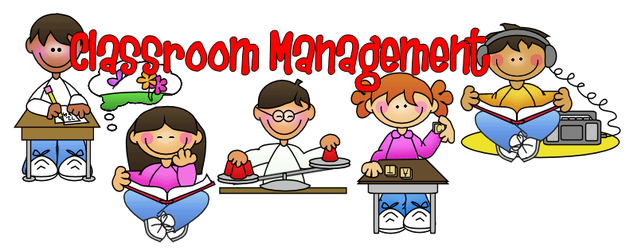- Make two sets of name tags – one for the child's table space or desk, and one for the child to wear around the neck.
- Hang name tags on a hook by the door.
- Have a Weekly Room Helper's Chart. Put children in charge of jobs such as:
- straightening the books (librarian)
- taking notes to office or another teacher (messenger)
- cleaning up the floor – all children should do this at the end of the session (room inspector)
- general teacher's helper (teacher assistant) and many more jobs.
- Always evaluate the day with the children before they go home. Praise them for jobs well done and mention things that will need to be worked on tomorrow.
- Establish a routine. Children thrive on a schedule.
- Don't speak when children aren't listening and ready. Wait.
- Establish a signal for getting the group's attention:
- turn off the lights
- clap a pattern with your hands
- say “Freeze!” and everyone halts right where they are, like a statue. Then say “Melt!” when you are ready for them to move again.
- Establish and discuss room rules and consequences of misbehavior.
- Post room rules and consequences of misbehavior.
- Keep a large, clear, see-through plastic jug on a table or countertop. When students are being good workers, drop a nut (walnut) or (chestnut) or little pebble inside with much ceremony and praise. When the jug is filled, it's time for a treat (food, extra playtime, an extra story, a game). Then empty the jug and begin again.
- Special food treats like cookies, popcorn, or small candies work well for rewarding modified behavior.
- Select a different student each class to be the teacher's partner as line leader. Be sure to hold hands.
- Establish good listening habits for story time. Sometimes we read and listen, and sometimes we read and discuss, but we always listen.
- Send a child to a nearby seat (behind the audience) during story time if he or she cannot conform to listening standards. That way, the child is away from the group but can still hear the story.
- Don't give the child more work as punishment, and don't take away the child's play time as punishment. Work with your rules and consequences instead.
- Invite a good student-citizen to sit at the teacher's desk during snack time or work time, for instance. The especially rewards a good citizen.
- Give a special certificate to good workers.
- Keep the lights off and heads down for a rest when noise level is too high. Tell them, "Noisy boys /girls are tired boys /girls, and your noise is telling me that you're tired and need a nap. So OK, that's what we'll do."
- Speak with a soft voice and children will usually respond in kind. However, pretend to take a very loud voice out of your pocket and use it, and then put it back-with a dramatic flair. Children don't like the loud voice, and you can assure them that you don't either, so you want to keep it in the pocket with their help.
- Use puppets to help with classroom management. Puppets can whisper in the teacher's ear, and they can write messages to the class.
- Compliment leadership in students. "Oh, I like the way Dana is ready!" will cause everyone to turn to look at the ready student and to get ready also.
- Use the same standards for everyone – no favorites!
- Over-plan for the day. (If you find that you have time on your hands, you will need to work on additional circle time activities, learning games, or alphabet and number activities.)
- Have a little broom and dustpan handy for clean-up.
- Use your eyes--look directly at children when speaking to them. Use the "eyes in the back of your head" to ward off potential problems.
- Use nonverbal communication to send positive and negative messages to the students (smile, wink, nod, give a thumb's up, raise an eyebrow, put a finger to your lips for quiet, and so on).
- Remember, the role of the teacher is to lead. Children follow the leader. If the teacher does not step forward as a strong leader, the children will follow the one who does and unfortunately, that can be a noisy child who is acting out.
- Communicate with a child behaving outside acceptable boundaries. Often a child who is acting out may be doing it because she or he does not know the behavioral boundaries. Take that child aside and make sure he or she understands the common rules. Reassure the child that you know she or he can do well.
- Find something to like and enjoy about each child, and praise it.
- Tell children when they're doing well. Tell them when they've done well. Tell them if they're not living up to the expectations set forth in the classroom or building goals.
- Employ The Magic Touch – touch children, hold their hand or smile at them.
- Keep in mind that your elementary students are “works in progress.” They're depending on YOU. Have a kind heart and a firm will. Develop patience. Never hold a grudge! Each day is a new day!
https://www.teachervision.com/pro-dev/classroom-management/6752.html?page=2

No comments:
Post a Comment